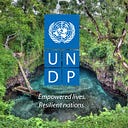Methodist Church in Samoa launches biogas system
Renewable energy efforts take another significant step forward
Written by Laufaleaina Lesa, UNDP Samoa, Communications Analyst & Roland Setu, IMPRESS Project, Coordinator
The Ministry of Natural Resources and Environment has officially launched one of its five Community Biogas Systems at the Methodist Land Development — Ofisa I Faleula.
The launch marks a milestone for the successful development of biogas systems in the communities as part of a pilot programme under the Improving the Performance and Reliability of Renewable Energy Power Systems in Samoa (IMPRESS) Project.
The IMPRESS Project aligns with the Ministry and Environment Sector’s target to improve sustainable and cost-effective utilization of indigenous renewable energy resources for energy production in Samoa, especially within communities.
The development of the Biogas Systems within the communities, including the Ofisa I Faleula one is done through Component 2 (Renewable Energy-Based energy system improvements), and Component 4 (Productive & Social Uses of Renewable Energy) of the project.
The partnership between the Ministry and the Methodist Church of Samoa was done to improve the quality of life for church members through the use of sustainable energy system technologies.
The selection of the pilot site was done according to the availability and sustainability of the feedstock (i.e. livestock and crops).
Apart from the gas produced, the IMPRESS Project has also seen other benefits of the pilot project towards the Methodist Church’s developments through the interest shown by its educational institutions, such as its Wesley College, to integrate sustainable development into their curriculum.
“It’s very important for us as students to know and understand the kinds of renewable energy systems that are available in Samoa, like biogas, so that we can learn more about them as we are the future of our nation, and whether this is a career that we can pursue when we finish school,” said Faaolo, a Wesley College student.
The IMPRESS Project partnered with the BioEnergy Solutions Technology (B.E.S.T) Company Limited to construct the system for the Methodist Land Development.
“The system we were able to build for Faleula is 11 cubic meters (m3). The system is designed with a single digester to receive all wastes from piggery. The gas holder for this particular system is 1m3,” said Mr. Usufono Fepulea’i, Director, B.E.S.T Co. Ltd.
The construction of the site began on the first week of March and was completed in July 2021. The Contractor had also assisted the Project in providing technical trainings for selected members from the Methodist Land Development to be System Operators of the Biogas System.
“At this moment, the gas is collected through gas bags and transported to the Ofisa I Faleula for daily use. These gas bags are refilled every time as we need to keep using the gas produced by the system,” said Reverend Taina Taina, Manager of the Methodist Land Development.
“The biogas system will use waste from the piggery farm food scraps to generate biogas for cooking and lighting purposes. It is anticipated that this project will have multiple benefits for our community in terms of utilizing waste to generate biogas; improved on-site waste management technology; cost efficiency; create employment opportunities for locals to collect waste to feed the digester; education and awareness of younger and future generations; and more importantly, this renewable energy technology will assist in the reduction of greenhouse gas emissions,” said Frances Brown-Reupena, Chief Executive Officer of the Ministry of Natural Resources and Environment.
The construction of the Biogas System for the Methodist Land Development costs approximately $98,000 Tala. This development was funded by the Global Environment Facility (GEF), and the United Nations Development Programme (UNDP); and co-financed by the Government of Samoa, as well as assistance from other government ministries within the Energy Sector.
The Ministry and UNDP acknowledge the interest of our local communities and the support of our stakeholders in delivering initiatives to reduce greenhouse gas emissions and provide clean and affordable energy for our communities.
ENDS
